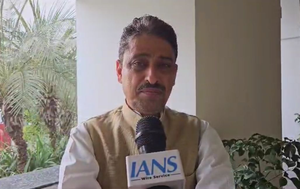Seattle: Research work on using a Wi-Fi router as a source of untapped energy — anchored by an Indian doctoral student in the University of Washington — has been judged to be one of the most innovative and game-changing technologies of 2015, by Popular Science magazine. It has been included in the magazine’s annual “Best of What’s New 2015” awards announced two days ago. The University team led by electrical engineering doctoral student Vamsi Talla used ambient signals from a Wi-Fi router to power sensors in a low-resolution camera and other devices. Talla is an alumnus of Delhi Public, Panipat Refinery and IIT Guwahati. The technology made headlines earlier this year when researchers published an online paper showing how they harvested energy from Wi-Fi signals to power a simple temperature sensor, a low-resolution grayscale camera and a charger for a Jawbone activity tracking bracelet. (See IndiaTechOnline story) The final paper will be presented in December at the Association for Computing Machinery’s CoNEXT 2015 conference in Heidelberg, Germany, on emerging networking experiments and technologies. “For the first time we’ve shown that you can use Wi-Fi devices to power the sensors in cameras and other devices,” says Talla, “We also made a system that can co-exist as a Wi-Fi router and a power source — it doesn’t degrade the quality of your Wi-Fi signals while it’s powering devices.”
PoWi-Fi could help enable development of the Internet of Things, where small computing sensors are embedded in everyday objects like cell phones, coffee makers, washing machines, air conditioners, mobile devices, allowing those devices to “talk” to each other. But one major challenge is how to energize those low-power sensors and actuators without needing to plug them into a power source as they become smaller and more numerous. The team of UW computer science and electrical engineers found that the peak energy contained in untapped, ambient Wi-Fi signals often came close to meeting the operating requirements for some low-power devices. But because the signals are sent intermittently, energy “leaked” out of the system during silent periods. The team fixed that problem by optimizing a router to send out superfluous “power packets” on Wi-Fi channels not currently in use — essentially beefing up the Wi-Fi signal for power delivery — without affecting the quality and speed of data transmission. The team also developed sensors that can be integrated in devices to harvest the power. In their proof-of-concept experiments, the team demonstrated that the PoWi-Fi system could wirelessly power a grayscale, low-power Omnivision VGA camera from 17 feet away, allowing it to store enough energy to capture an image every 35 minutes. It also re-charged the battery of a Jawbone Up24 wearable fitness tracker from zero to 41 percent in 2.5 hours.
The researchers also tested the PoWi-Fi system in six homes. Users typically didn’t notice deterioration in web page loading or video streaming experiences, showing the technology could successfully deliver power via Wi-Fi in real-world conditions without degrading network performance. Although initial experiments harvested relatively small amounts of power, the UW team believes there’s opportunity for make the PoWi-Fi system more efficient and robust. “In the future, PoWi-Fi could leverage technology power scaling to further improve the efficiency of the system to enable operation at larger distances and power numerous more sensors and applications,” said co-author Shyam Gollakota, assistant professor of computer science and engineering. The research is funded by the National Science Foundation, Qualcomm and the UW. Co-authors include UW electrical engineering doctoral students Bryce Kellogg and Saman Naderiparizi, research associate Benjamin Ransford and associate professor of computer science & engineering and of electrical engineering Joshua Smith.
Recent Random Post:
















